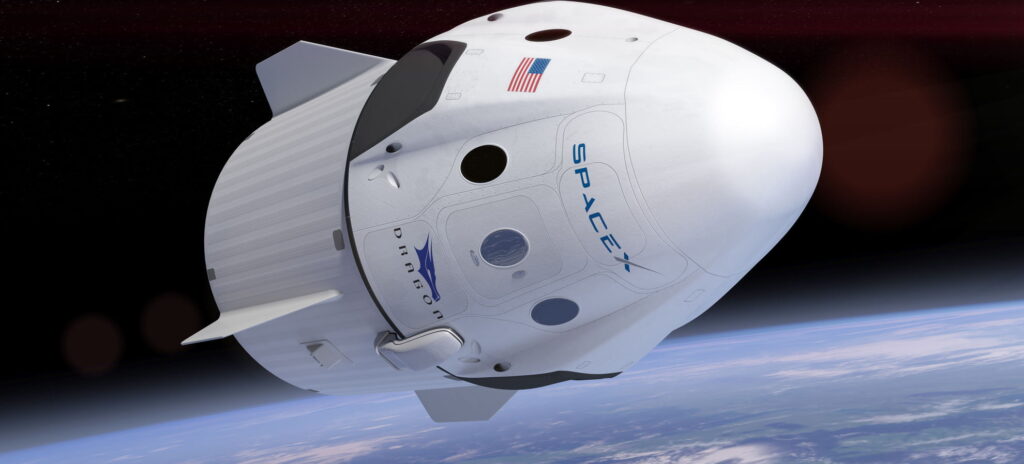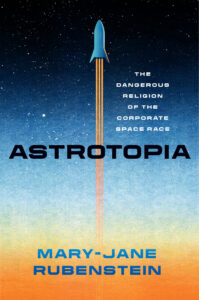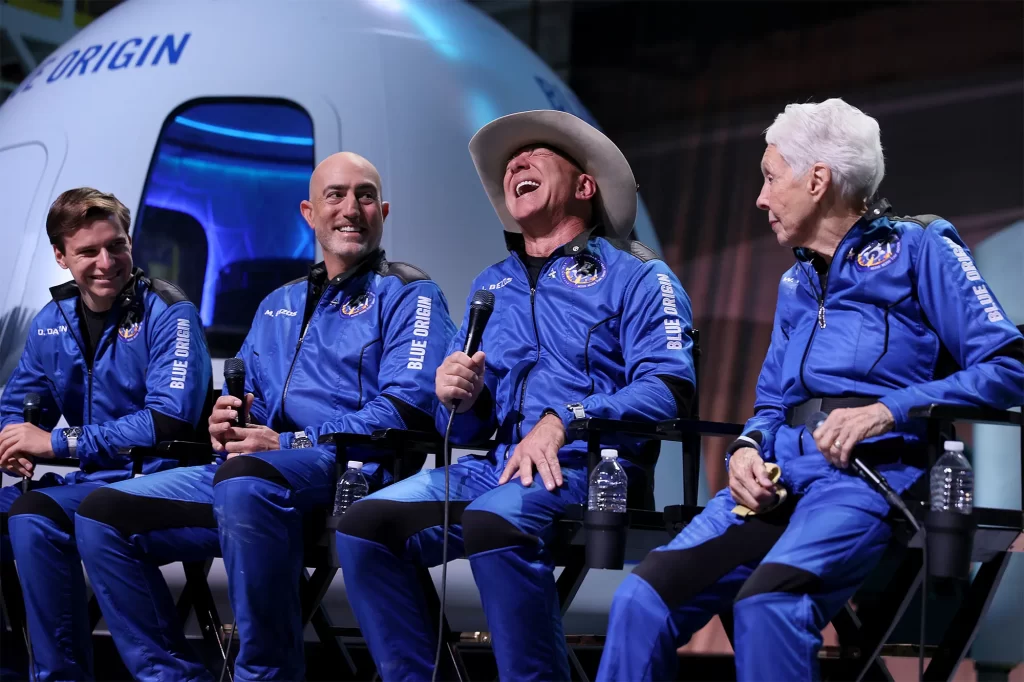The False Messiahs of Space Exploration
A review of Astrotopia: The Dangerous Religion of the Corporate Space Race

(Image source: California Business Journal)
On July 24, 1969, the day American astronauts safely splashed down in the Pacific Ocean after humankind’s first expedition to the Moon, Wernher von Braun, the former Nazi rocket scientist turned aerospace engineer and one of the architects of the American space program, addressed journalists—and the world—from the Madison County courthouse in Huntsville, Alabama. After a cheering crowd carried von Braun on their shoulders and set him down onto the courthouse steps, von Braun described the United States’ moonshot as an exercise of “genuine brotherhood with all nations.” The lunar landing, von Braun rhapsodized, represented more than technological prowess: it was symbolic of how “the ultimate destiny of man is no longer confined to the earth. I hope now that these brave Apollo eleven astronauts can be assured that their trip was not in vain, that our reach into space will be continued and that from their brief journey of exploration there will be a brighter future for mankind.”
And, in a soundbite that more than a half-century later still lingers as a challenge, von Braun observed that even though “the moon is still commuter traffic as far as the universe is concerned…like commuting from the suburbs to the city” there are other planets to conquer. Von Braun believed our next stop was so obvious that he prefaced his statement with “of course”: “there is the planet Mars.”
This flung gauntlet has famously been picked up by Elon Musk, one of humanity’s would-be astro-saviors profiled in Mary-Jane Rubenstein’s Astrotopia: The Dangerous Religion of the Corporate Space Race. In her previous books, Rubenstein, professor of religion and science at Wesleyan University, has tackled everything from terrestrial pantheism to the multiverse. Her work is always delightfully readable and engagingly enlightening, but Astrotopia feels more immediate, because the message is both timely and urgent. A book of cultural criticism as well as consciousness raising, Astrotopia is meant to reach beyond the philosophers of religion and space historians to the interested layperson who needs to know how the world’s wealthiest people are “rehashing” themes of Christian conquest to justify their manifest destiny in space. If they succeed, Rubenstein warns, outer space—“once the stuff of infinite possibility”—will become “just another theater of greed and war.”
 Astrotopia is a cautionary tale—which is a bit out of character for the field of space history, a genre that tends toward positivist and triumphalist narratives of conquest—about the power of tales, fables, and myths; namely, it is a reminder that, whether they are told as history or as legend, we should pay attention to stories that tell humans the whole universe is ours for the taking. In particular, we should be skeptical of billionaire space cowboys like Musk and Jeff Bezos, who tell exciting stories of rockets and space colonies and terraforming other planets, but leave out that this all comes at the expense of life on this one. So, on the one hand, Astrotopia is an introduction to the “NewSpace race,” which Rubenstein explains is “as much a mythological project as it is a political, economic, or scientific one,” as well as a handbook on how to resist the siren song of corporate cosmic saviors promising infinite wealth in the stars. On the other hand, it is also a reminder that just because a story is timeworn does not mean it’s true or right. For Rubenstein, this means that we must “unearth the old, destructive myths behind the escalating NewSpace race and let other myths guide us.”
Astrotopia is a cautionary tale—which is a bit out of character for the field of space history, a genre that tends toward positivist and triumphalist narratives of conquest—about the power of tales, fables, and myths; namely, it is a reminder that, whether they are told as history or as legend, we should pay attention to stories that tell humans the whole universe is ours for the taking. In particular, we should be skeptical of billionaire space cowboys like Musk and Jeff Bezos, who tell exciting stories of rockets and space colonies and terraforming other planets, but leave out that this all comes at the expense of life on this one. So, on the one hand, Astrotopia is an introduction to the “NewSpace race,” which Rubenstein explains is “as much a mythological project as it is a political, economic, or scientific one,” as well as a handbook on how to resist the siren song of corporate cosmic saviors promising infinite wealth in the stars. On the other hand, it is also a reminder that just because a story is timeworn does not mean it’s true or right. For Rubenstein, this means that we must “unearth the old, destructive myths behind the escalating NewSpace race and let other myths guide us.”
With all this in mind, Rubenstein first introduces readers to Elon Musk and his delusions of Martian messianism. While today he is the most famous proponent of settling Mars, Musk’s plan for Mars is perhaps not what von Braun had in mind when he casually mentioned that Mars was humanity’s newest new frontier. Von Braun’s plans for Mars were scientific; all the way back in 1949 he proposed a purely empirical—not empire-building—mission to the red planet that would explore Mars from its poles to its equatorial canyons.
But Musk’s plans for Mars are considerably more pyrotechnic. Instead of landing on and studying the Martian poles, Musk proposes to—and he actually means this—“nuke Mars.” As Rubenstein explains, in the gospel according to Elon, all it takes to transform “a freezing, radioactive, blood-boiling planet and make it more like our life-loving Earth” is dropping some atomic bombs at the poles, which will immediately fill the atmosphere with moisture and thus jumpstart the process of making our neighboring planet habitable…theoretically. Should this mission happen to be accomplished, Musk has promised to then “build an interplanetary transportation system akin to the transcontinental railroad” in the spirit of nineteenth century American tycoons. The Martian Trail—which, as even Musk acknowledges, will be like an especially bummer version of the Oregon Trail, because “there’s a good chance you’ll die” (Musk quoted on page 15)—will involve a seven-month trip from Earth on what Musk calls the “Big Fucking Rocket”: a conveyance Musk describes so rapturously that it sounds like, in Rubenstein’s phrasing, “an astronautic Club Med.” The trip will cost upwards of $200,000 per person (a literally astronomical sum) and likely be staffed by indentured servants who are paying for their transport with their bondage. These first colonists will give way to more as humanity succeeds in what Muskivites describe as “hacking Mars”: transforming another planet to serve our terrestrial needs. Terraforming Mars is Musk’s version of salvation, which Rubenstein reads in his declarations that our future on Mars represents “duty to maintain the light of consciousness, to make sure it continues into the future.” (Musk quoted on 136).
When compared to Musk, Jeff Bezos’s plans for space seem almost reasonable. That is, of course, until Rubenstein exposes the sinister underbelly. Bezos, Rubenstein explains, got space religion when he was at Princeton in the 1980s. Bezos’s passion for moving off world began when he audited “the physicist-prophet” Gerard O’Neill’s seminars on “teaching the world’s future rulers how to expand their empires into space.” O’Neill’s famous late-1970s ruminations on mining other planets, moving heavy industry to low-Earth orbit, and creating extraterrestrial human habitats out of asteroids eventually blossomed into Bezos’s 21st century prophecy of a future in space. Bezos’s proposal, unlike “nuking Mars,” is for the extraction of resources like rare-earth metals from asteroids or the Moon and space colonies that relocate most of humanity off-planet in torus-shaped “climate-controlled Edens.”

(Jeff Bezos laughing in a cowboy hat and spacesuit. Image source: Joe Raedle for Getty Images)
In Bezos’s millennialist vision, the finite resources of Earth—from fuel for energy to human brainpower—will inevitably spiral downward at some point in the near future. So, in Rubenstein’s interpretation, because Bezos wants humanity to “keep moving ‘forward’”—an adverb that in this case denotes “the relentless pursuit of profit” rather than directionality—he is “spending his money and time exporting the whole damned system into space.” Bezos’s plans for space reflect not only his engineering interests, but his feelings about Earth, as well. Because the wellspring of terrestrial resources is drying up, Bezos plans to save Earth by pillaging the cosmos.
“So these are the two utopias” presented by Musk and Bezos, Rubenstein explains: “‘fuck Earth and occupy Mars’ versus ‘save Earth by drilling the universe.’”
Astrotopia is downright fun when it’s centered on the two focus-pulling, spotlight-stealing, grand-gesturing, dueling ringmasters themselves—Musk and Bezos—mostly because Rubenstein’s tone as she recounts the litanies of their outsized ideas is that of an exasperated Greek chorus; you can almost hear her sigh in frustration as she explains in the introduction that, because of these guys and their ilk, space is literally and metaphorically “an absolute mess.” There are other performers in the NewSpace circus too, and Rubenstein traces a careful summary of their plans for space—commercial, capitalist, political, militaristic (why else a Space Force?!)—with an emphasis on corporate hopes and dreams of “converting the cosmos itself into capital and conquering space, the final frontier.”
Rubenstein is careful never to lose her larger message which, appropriately enough in a book about our future in the solar system, she returns to elliptically throughout, swinging wider with each pass. Rubenstein connects the current space race with historical explorations of Earth that began with the so-called conquest of the Americas that led to Biblically-sanctioned genocide and the obliteration of whole ecosystems, to the modern halo of garbage that has rendered near-Earth orbit a literal disaster—where “the stars (astra) are out of place, throwing everything out of order.” For Rubenstein, these cycles of religious, space, and cultural history represent the stories that need to be retold, the myths that need to be remade so we finally “stop pretending that escaping Earth is going to solve our problems…we’ll bring them all along with us one way or another.”
But what is the solution to this “cosmic messianism” of Musk, Bezos, et al.? For Rubenstein, the biggest problem with these astrotopians is that their seemingly beneficent goal to stop humanity’s pillaging of the Earth is really a cover for seeking “more land and resources to plunder in space.” But this is directly in conflict with all the people—the poor, the oppressed, the hungry—who do not want to transplant into the solar system the same power structures that enabled the ransacking of the Earth and the subjugation of whole societies. They want—and, Rubenstein argues, we should all want—a new paradigm. What this situation calls for, then, is to decolonize space, which Rubenstein establishes from the beginning as a movement that, in her words, centers:
“Black and Indigenous voices in all plans concerning extraterrestrial labor and territory, which must not be romanticized as ‘hard work’ and the ‘empty frontier.’ It would also mean refraining from polluting other planets (and the interplanetary spaceways), refraining from extracting ‘resources,’ refusing to commodify land, and subjecting private enterprises like SpaceX and Blue Origin to strict national and international regulation. In this way…space might escape its romantic but sinister designation as ‘the final frontier.’”
Or, in the words of the oft-quoted musician Sun Ra, decolonizing space would mean finally being able to see how the colonized on Earth are filled with “a burning need for something else.”
That “something else” Rubenstein finds not in the astrotopians’ visions of a “cosmic future” but in genres like Indigenous Futurism, which recovers “the deliberately erased histories of colonized and oppressed peoples [to] sift through them to find the most life-giving stories, and bundle them together with the mess of the modern world to imagine new ways of being.” Or the Afrofuturism movement, which is predicated on the fact that “African-descended people already know how to survive the apocalypse and live on other worlds.” Or literally any global institutional religion, nearly all of which, Rubenstein maintains, have long ago abandoned “imperial Christendom’s ‘human dominion’ line” for stewardship and social justice. The only people who haven’t, Rubenstein warns, are “atheist billionaires” who “insist that their investors’ bottom lines” are more important than the Earth and, to get us off it, are still “selling a Christian doctrine that even the Christians have abandoned.”
In other words, the only way to combat the old stories that justify mining the asteroids and “hacking” Mars is to find new stories. As Rubenstein explains, “if we want to get right with space, we’re going to have to get right with religion” by retelling stories of dominion and conquest as stories of conservation and harmony; exposing the bad mythologies behind modern science; finding new stories that “put caretaking over profit and harmony over ownership”; and creating stories that “tell us not how the universe might belong to us but how we might belong to the universe.”
One old story that the corporate cosmic messiahs should revisit is how their heroes of the first Space Age approached their task with humility and contemplation. At a prayer breakfast in April 1969, just three months before Apollo 11, von Braun—who clandestinely became a born-again Christian during his post-war years—cautioned that a balance must be struck between science and morality. While science can “enable us to fly to the moon” it does not provide any ethical guidance on whether humans should “destroy our home planet with the atom bomb [and] whether we should use the power at our disposal for good or evil.” Instead, the man who designed the original big f’ing rocket—the Saturn V—tells his listeners that the “guidelines of what we ought to do are furnished in the moral law of God.” We can believe a myth that tells us we should take godlike power for ourselves and plunder the solar system. Or, as von Braun says in the closing of his speech, rather than praying “that God may be with us on our side,” we should learn “to pray that we may be on God’s side.”
Catherine L. Newell is an associate professor of religion and science at the University of Miami. She is the author of Destined for the Stars: Faith, the Future, and America’s Final Frontier (University of Pittsburgh Press 2019).
***
Interested in more on this topic? Check out episode 31 of the Revealer podcast: “The Corporate Space Race and Religion“.